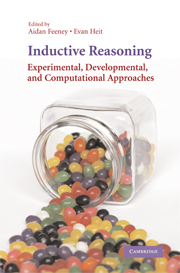Book contents
- Frontmatter
- Contents
- List of Figures
- List of Tables
- List of Contributors
- Preface
- 1 What Is Induction and Why Study It?
- 2 The Development of Inductive Reasoning
- 3 Interpreting Asymmetries of Projection in Children's Inductive Reasoning
- 4 Property Generalization as Causal Reasoning
- 5 Availability in Category-Based Induction
- 6 From Similarity to Chance
- 7 Theory-Based Bayesian Models of Inductive Reasoning
- 8 Use of Single or Multiple Categories in Category-Based Induction
- 9 Abductive Inference: From Philosophical Analysis to Neural Mechanisms
- 10 Mathematical Induction and Induction in Mathematics
- 11 Induction, Deduction, and Argument Strength in Human Reasoning and Argumentation
- 12 Individual Differences, Dual Processes, and Induction
- 13 Taxonomizing Induction
- Index
12 - Individual Differences, Dual Processes, and Induction
Published online by Cambridge University Press: 26 February 2010
- Frontmatter
- Contents
- List of Figures
- List of Tables
- List of Contributors
- Preface
- 1 What Is Induction and Why Study It?
- 2 The Development of Inductive Reasoning
- 3 Interpreting Asymmetries of Projection in Children's Inductive Reasoning
- 4 Property Generalization as Causal Reasoning
- 5 Availability in Category-Based Induction
- 6 From Similarity to Chance
- 7 Theory-Based Bayesian Models of Inductive Reasoning
- 8 Use of Single or Multiple Categories in Category-Based Induction
- 9 Abductive Inference: From Philosophical Analysis to Neural Mechanisms
- 10 Mathematical Induction and Induction in Mathematics
- 11 Induction, Deduction, and Argument Strength in Human Reasoning and Argumentation
- 12 Individual Differences, Dual Processes, and Induction
- 13 Taxonomizing Induction
- Index
Summary
In this chapter I hope to demonstrate that answering the question “who does what in reasoning experiments?” can also help us answer fundamental questions about the nature of thought. Because it is nearly always the case that some experimental participants display phenomena of interest and others don't, almost every experiment run by cognitive psychologists produces data on individual differences. But, as most psychologists do not wish to take differences between their participants as the starting point of their investigations, individual differences tend to be ignored. Thus, the means that experimental psychologists report when they describe their data abstract across differences between individuals, with only the standard deviation or standard error indicating the extent to which participants varied in their responses. In this chapter I will address what the study of differences between individuals might tell us about a range of issues in inductive reasoning, including what constitutes a good inference, what processes underlie induction, and how induction differs from deduction.
My primary focus will be on the general question of how individual differences data support dual-process theories of thinking (Evans & Over, 1996; Stanovich, 1999; Sloman, 1996). Dual-process theories have been applied to deduction, decision making, and induction. I will outline the dual process approach and describe evidence in its favour, paying particular attention to individual differences. I will also describe how individual-differences methodology has been used to arbitrate between different normative accounts of specific thinking tasks (see Stanovich & West, 1998b, c). With this background covered I will consider what individual differences might tell us about category-based induction.
- Type
- Chapter
- Information
- Inductive ReasoningExperimental, Developmental, and Computational Approaches, pp. 302 - 327Publisher: Cambridge University PressPrint publication year: 2007
- 1
- Cited by

